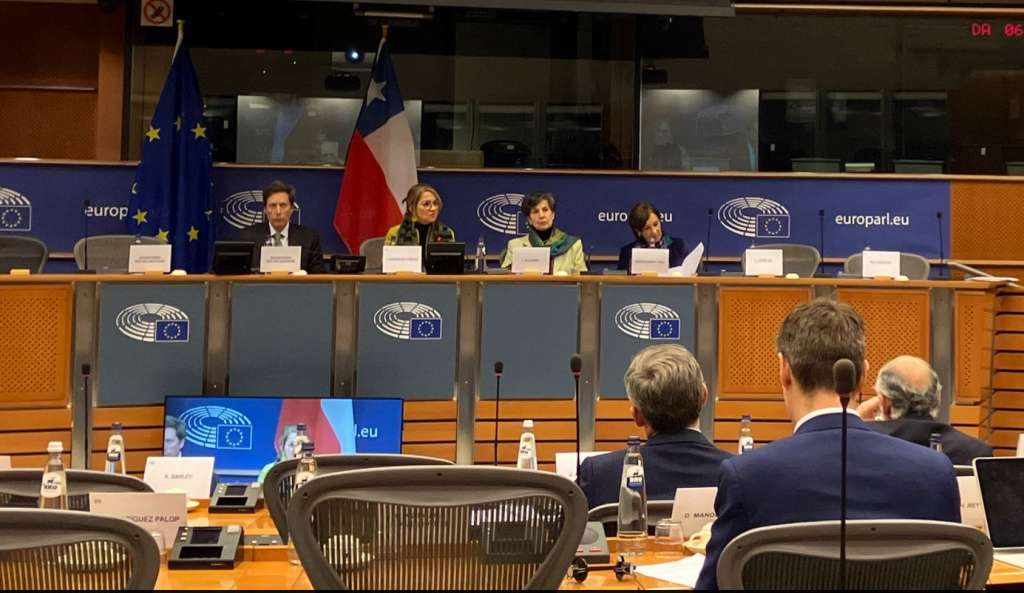IRENE LANZACO (AMI): 'OUR LAWSUIT IS BASED ON THE REPEATED FAILURES OF META TO COMPLY WITH EUROPEAN DATA PROTECTION REGULATIONS'.

By Jesús González Mateos, president of EditoRed, director of Aquí Europa and Canal Europa
To see the video of the interview, click on this link.
Interview with the CEO of the Spanish Media Association (AMI), which has filed a lawsuit against META, the company that owns Facebook and Instagram, for illegal use of data. It is a claim for 550 million euros.
Aquí Europa: We’re with Irene Lanzaco, director general of the Spanish Media Association. You have filed an important lawsuit of relevance not only for Spain, but also at the international level for the media. What are the motives, the criminal facts that you see and that justify this lawsuit against META?
Lanzaco: The first thing I would like to point out is that the lawsuit is based on repeated breaches by META of European data protection regulations, which require that for a company to use the personal data of Internet users it must obtain authorization through a legally valid mechanism. Well, from different resolutions of the European authorities, it has been perfectly established that META systematically and massively breaches the legal requirements that have been designed at the European Union level to protect the right to privacy of European citizens. And this conduct is done for no other purpose than to obtain a massive economic return from the sale of advertising space in violation of all European rules.
Aquí Europa: To make it clear to the audience, in what way does META illegally use people’s personal data?
Lanzaco: From the moment a user logs into a META system, META tracks through different digital techniques all the behavior of that user in the whole digital ecosystem. META then classifies the information it has obtained from that user and makes an approach to advertisers to offer them the segmented audiences that can best connect with their products.
This allows META to obtain an absolutely privileged position in the market because it is able to tune the needs of advertisers with the interests of users. Why do we say that this is detrimental to Spanish media? Because to the extent that META has made all this advertising offer in an illegitimate way by obtaining data without respecting the European regulation, it has been able to obtain an absolutely millionaire income from the advertising market that has gone to META’s platforms and not to the Spanish media that in normal conditions would have opted for this advertising.
Aquí Europa: Is it unfair competition, therefore, and also data theft?
Lanzaco: That’s right, I think we are at a key moment in which society is understanding what META’s behavior is. How the platforms are abusive, intrusive in the sphere of people’s privacy. And not only that, we have also just seen how a large number of American States have filed at the end of October a very important lawsuit against META for understanding that all its applications have been designed in a way that harms the mental and emotional development of our children through addictive applications, exposing them to content that reaffirms suicidal ideas, ideas of negative visualization of their own body or exposure to violent content. All this in an absolutely terrible exercise for their own benefit. Because what the people at META have studied, and what is stated in their internal memos, is that all this behavior is what it does is to retain the user’s attention on their platforms. And the more the user’s attention is retained on their platforms, the more their revenues grow. Despite knowing, I insist, that all these behaviors are damaging the mental health of children and also of the rest of the citizens.
Aquí Europa: What are the demands of the lawsuit?
Lanzaco: Well, basically what we are requesting is that META compensate the Spanish media for the damages that have been caused to us. I have to say that, although at first sight it may seem that the demand of 550 million euros is a high amount, it is not at all. The amount has been calculated in a quite conservative way and what we would also like is to call the attention of the whole society to flee from the platforms, to concentrate their attention on information media that are responsible in reliable environments and that we, the information media, are here to serve society, to provide citizens with their right to information.
And although sometimes we make mistakes, how can we not make them with hundreds of news and thousands of information we publish every day, we are responsible media, we have a very clear identity and when we make mistakes we answer for our mistakes with our own publications and before Justice, with our patrimony.
Aquí Europa: I suppose that in all this legal action there has been a relationship and a follow-up of what the European institutions are doing, especially the European Commission, which approved the Digital Services Act, has asked the large aggregators, the large platforms, for information on what their uses are and what they are doing. In the case of META, this information is pending to be sent.
Lanzaco: Absolutely, yes, I think the role that Europe is playing is fundamental. The European Commission and the European Parliament. They have been very courageous in putting on the table legislative developments that allow European citizens to obtain protection against the big technological giants. This protection, which is conferred by Europe, is not only for the benefit of citizens, but also for the benefit of companies, which see their sustainability threatened by the excessive concentration of power in a few large technological giants, which operate with opacity and with much disregard for European legislation.
Aquí Europa: Finally, I would like you to make special mention of what this kind of practices mean for the sustainability of the media business, which in the end are also guarantors of freedom of expression, of the right to information. How much is at stake in this?
Lanzaco: Well, I would say that absolutely everything is at stake. The Ministry of Economy recently published data showing that the media are the second most digitized sector of the Spanish economy, only behind the technology companies themselves. And yet, despite the fact that publishers have made a very big bet on the Internet and that our audiences are massive, we have serious difficulties to monetize them because there is this situation of behaviors that are considered more unfair by the large platforms and that affect not only the field of data and advertising, but also other areas such as intellectual property. META is also responsible for massively disseminating through its different channels, with a very significant impact on WhatsApp, journalistic products in a pirate way, thus depriving the media from obtaining the income that is legitimately ours and that the media need to sustain their informative structures and that are absolutely key to the defense of the democratic quality of our country.
Aquí Europa:Well, thank you very much. And first of all, congratulations for your courage, because before you were talking about courage in the European elections, but you have to have courage as editors to fight with giants of such magnitude. META is a giant compared to what we Spanish media are.
Lanzaco: Thank you very much. As you say, this is a case in which we see David against Goliath, but we are absolutely convinced of the legitimacy of our claims and we will fight for the courts to recognize it and we hope to always serve Spanish society in the exercise of its right to information.
This interview was originally published in Aquí Europa and Canal Europa. If you intend to use the text, please cite the mentioned media.



